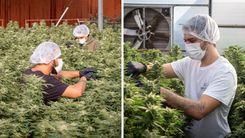Study indicates that cannabis compound can combat viruses affecting shrimp farming
Research identifies cannabidiol (CBD) as a promising and sustainable alternative for controlling viral diseases in aquaculture, replacing the use of antibiotics
Published on 08/05/2025

Illustrative Image: Canva Pro
Shrimp farming, one of the main activities in global aquaculture, faces increasing threats from highly lethal viruses and microsporidia, such as White Spot Syndrome Virus (WSSV), Enterocytozoon hepatopenaei (EHP), and Infectious Hypodermal and Hematopoietic Necrosis Virus (IHHNV). In the search for safer and more sustainable alternatives to antibiotics, a new study has pointed out cannabidiol (CBD), a compound extracted from the seed oil of Cannabis sativa, as a possible effective solution. Access the article from the Journal Of Fish Diseases
Molecular interactions confirm antiviral action
Through computational molecular docking analyses, researchers evaluated the interaction of CBD with essential proteins of the pathogens. The results showed strong binding affinities with EHP's beta tubulin (-6.61 kcal/mol), IHHNV's capsid protein (-6.72 kcal/mol), and WSSV's VP28 protein (-5.38 kcal/mol), suggesting the compound's inhibitory potential on the viral agents.
Safety and performance surpass other plant compounds
In addition to the antiviral effect, CBD presented favorable safety and pharmacokinetic profiles, with no evidence of mutagenicity, hepatotoxicity, or cardiotoxicity. The study also highlighted the superiority of cannabidiol compared to other natural compounds already tested in combating shrimp diseases, especially regarding binding stability, number of interactive residues, and bioavailability index.
CBD can enhance immunity and replace antibiotics
The research suggests that CBD can act as a dual-action agent: strengthening shrimp immunity and, at the same time, directly combating outbreak-causing viruses. This approach represents a significant advancement in the development of precise and environmentally friendly health management strategies in aquaculture.
Study paves the way for practical tests and regulation
The study authors recommend conducting in vivo tests to validate the effects observed in the laboratory, as well as studies focused on formulation, practical application, and regulation of CBD use in cultivation systems. The goal is to promote safer, more efficient, and sustainable aquaculture production, especially in regions of Asia and Latin America where viral outbreaks have caused significant losses.








